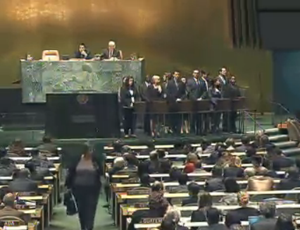
The UN General Assembly voted this morning for five non-permanent members of the UN Security Council in a far more exciting competition than expected. The states which are elected will serve two-year terms from 1 January 2012 through 31 December 2013, overlapping with for one year with Colombia, Germany, India, Portugal and South Africa who were chosen by the Assembly in 2010.
There was one seat available for three regional groups – Asia, Eastern Europe, and Latin America and the Caribbean – and two for Africa, with one of those reserved for an African Arab state. (Details on the candidates and regional group dynamics is available at this earlier post.)
Only three of the 5 seats were filled on the first ballot, with Guatemala, Morocco, and Pakistan winning handily.
A second round, using restricted balloting, was taken to fill the two remaining seats. Togo and Mauritania fought it out for the second African seat and Slovenia and Azerbaijan pushed forward without last place finisher Hungary for the single Eastern European seat. The second round produced no additional winners however as the remaining candidates still failed to secure the necessary 2/3 majority.
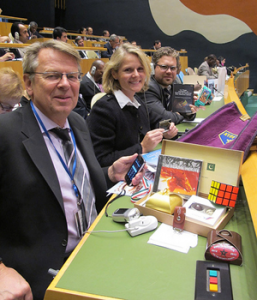
The shocker was Hungary‘s last place finish among the Eastern European group in the initial round, knocking it out of consideration on the second ballot. Azerbaijan‘s team is to be congratulated for securing the largest number of ballots in the first round in the Eastern European group against Hungary and likewise experienced competitor Slovenia. Togo‘s poor showing on the first ballot and second ballot for the Africa group was also surprising, considering it was put forward on a de facto clean slate as the only candidate for the non-Arab African seat. Pakistan secured exactly the necessary number of votes to prevent a run-off with Kyrgyzstan, who received the lowest votes of all candidates.
Following a third round, Togo finally crossed the finish line to win the remaining African seat, but the East European candidates still failed to get a majority. The President suspended the meeting, scheduling additional voting later in the day.
On most ballots, all 193 UN members voted, meaning that a state needed 129 votes to secure a seat. In some rounds, a few ballots were invalidated, reducing the necessary requirement to 128 or 127. The following chart provides the election results, with the number of votes each state received. States winning a seat are marked in bold.
| Regional Groups | Seats | First Ballot | Second Ballot (restricted) |
Third Ballot (restricted) |
| Africa | 2 | Mauritania (98) Morocco (151) Togo (119) |
Mauritania (72) Togo (119) |
Mauritania (61) Togo (131) |
| Asia | 1 | Kyrgyzstan (55) Pakistan (129) Fiji (1) |
||
| Latin America and the Caribbean | 1 | Guatemala (191) | ||
| Eastern Europe | 1 | Azerbaijan (74) Hungary (52) Slovenia (67) |
Azerbaijan (90) Slovenia (97) |
Azerbaijan (93) Slovenia (99) |
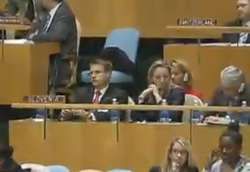
When the body resumed in the afternoon, Slovenia secured only 98 votes and Azerbaijan 93 votes on the fourth ballot. This triggered unrestricted balloting, opening up the race to any additional East European states who wanted to enter the race.
(In restricted balloting, only candidates in the previous round can be considered. Once three rounds of restricted balloting occurs with no winner can other candidates be offered for consideration.)
Hungary re-entered the race, voting for themselves, and apparently being the only one doing so. In contrast to the frustrated looks on the faces of the Slovene delegation, the Hungarians and the President of the General Assembly seemed amused by the latest results.
| Regional Groups | Seats | Fourth Ballot (restricted) |
Fifth Ballot (unrestricted) |
Sixth Ballot (unrestricted) |
| Eastern Europe | 1 | Azerbaijan (93) Slovenia (98) |
Azerbaijan (93) Slovenia (98) Hungary (1) |
Azerbaijan (96) Slovenia (95) Estonia (1) |
| Regional Groups | Seats | Seventh Ballot (unrestricted) |
Eighth Ballot (unrestricted) |
Ninth Ballot (unrestricted) |
| Eastern Europe | 1 | Azerbaijan (100) Slovenia (91) Estonia (1) |
Azerbaijan (110) Slovenia (80) |
Azerbaijan (113) Slovenia (77) |
After the 8th ballot, the President of the General Assembly adjourned the session, postponing any further voting until Monday. Azerbaijan objected, saying it had asked prior to the adjournment for consideration of extending the session an hour past the scheduled time to end. The President noted that the Slovene delegation has likewise moved to postpone further voting if the 8th ballot was inconclusive, and that simultaneous translation would not be available, but asked members as to their preference. France refused to continue without translation, but Russia requested the President to ask the translators to stay on for one last round. The President was reluctant, but eventually ruled that one last round of voting would take place.
In announcing the 9th round, the President noted that the rules provided for a return to restricted balloting after three inconclusive unrestricted rounds. When the votes came in, Azerbaijan took only 3 more votes away from Slovenia. This time, no one objected to the President’s postponing of further votes until Monday.
On Monday, voting resumed for several more rounds, with Slovenia and Azerbaijan advancing or slipping against each other by only 1 vote in each round. No potential compromise candidates emerged during the unrestricted rounds. It was only in the 15th round that the tallies shifted in a meaningful way with Azerbaijan moving further into the lead.
| 10th (r) | 11th (unr) | 12th (unr) | 13th (unr) | 14th (r) | 15th (r) | 16th (r) | |
| Slovenia | 83 | 82 | 81 | 80 | 81 | 76 | 77 |
| Azerbaijan | 110 | 110 | 111 | 111 | 110 | 117 | 116 |
With this shift, Slovenia’s delegation recognized that it could not overcome Azerbaijan’s sustained lead and announced its country’s withdrawal from consideration. Running unopposed did not guarantee Azerbaijan’s election, as the 17th round would be unrestricted and Azerbaijan would need to secure 2/3 majority against any new competitors that decided to jump in. By this time however, no one was interested in a renewed fight. Azerbaijan secured 155 votes, 26 more than the necessary majority; 13 states maintained their support of Slovenia, and Hungary’s delegation made one last hurrah with a vote for themselves in the final round.
After 17 ballots, 14 of which were for a single seat, the 2012 make-up of the Council will be the United States, the United Kingdom, France, Russia, China, Colombia, Germany, India, Portugal, South Africa, Morocco, Togo, Guatemala, Pakistan, and Azerbaijan. The latter five will serve through the end of 2013.


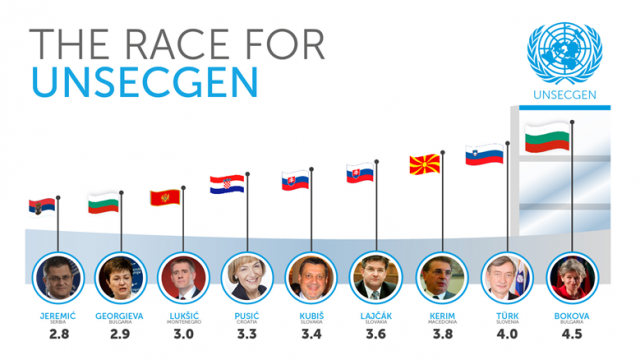
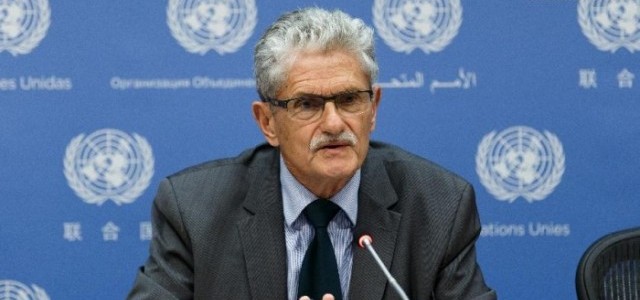
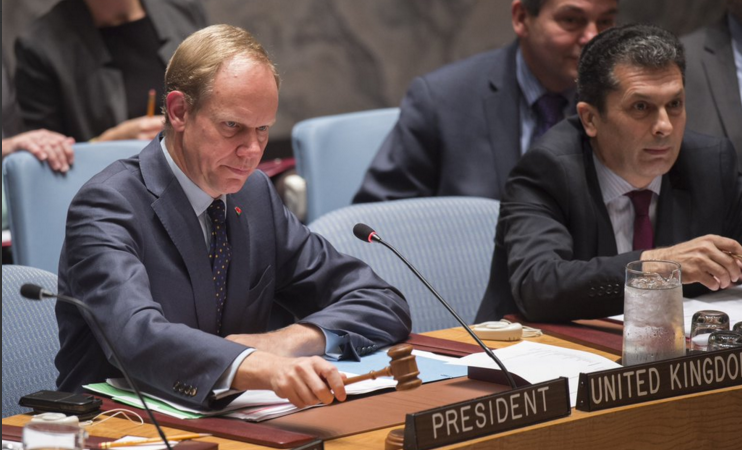
I believe the results of the 5th round are incorrect. Slovenia had 97 votes not 98.
Would like to know if there is a page where I can find countries’ voting in detail.
Hello Taha — the election of members to the Security Council is by secret ballot. Therefore there is no such detailed list.